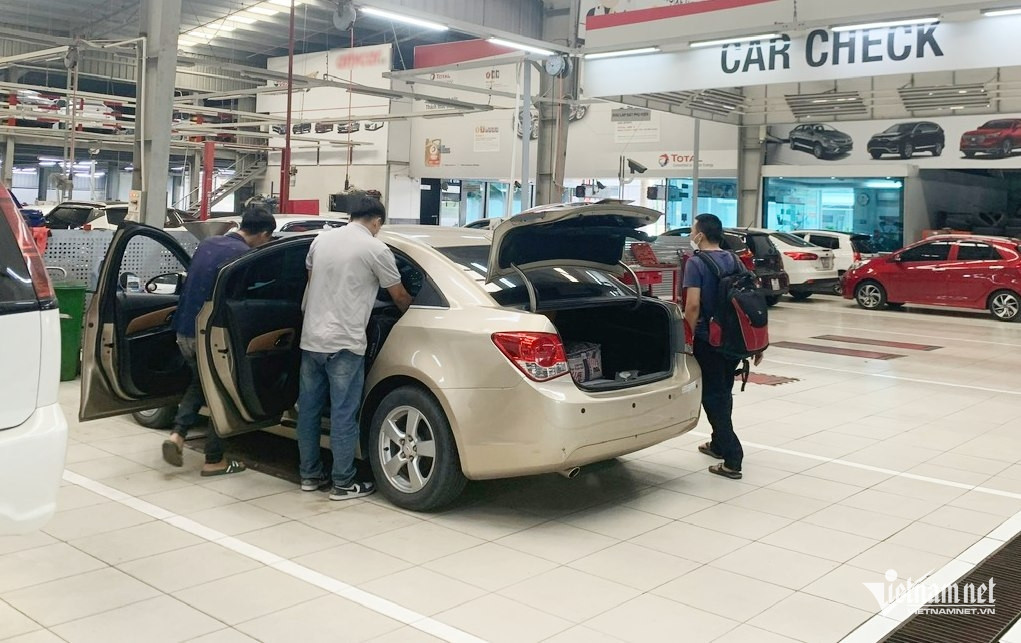
As Vietnam’s car market booms, “checking” used cars has emerged as a growing profession. Most inspectors are auto experts who help buyers verify a vehicle’s true quality and condition.
They play a vital role in today’s used car market, ensuring that buyers aren’t duped by hidden flaws, cosmetic fixes, or inflated prices and that cars are valued accurately.
Nguyen Trung K, an automotive engineer and director of a repair and car trading company in Cau Giay District in Hanoi, was a mechanic 15-20 years ago. With formal training and hands-on experience from fixing and trading hundreds of used cars, he became the go-to guy for friends, neighbors and even strangers needing a car check before purchase.
Sometimes, his friends and relatives would spend billions of dong to buy a car just after his nod. And eager buyers would hesitate and look elsewhere if he flagged issues.
“At first, I did it for free to help friends find good, suitable cars. But after a while, people began giving me small thank-you payments—VND500,000, or VND1 million—for my time and effort that helped them get satisfactory cars. It wasn’t much, but it felt fair, so I accepted it happily,” K told VietNamNet.
At his peak, he could earn VND10-15 million monthly just by “selling advice”—accompanying buyers to inspect and finalize deals. Not a fortune, but generous for the effort.
Later, K opened a used car showroom and garage to provide repair and maintenance services. His business now also offers “car check” services, charging VND1-2 million per check, depending on the car and location, giving customers peace of mind when buying their dream ride.
K explains that car checking demands deep automotive knowledge across various models. Inspectors must understand engines, transmissions, chassis, electrical systems, and interiors to spot issues in old cars.
Car inspectors also need to be cautious and meticulous. They analyze a car’s condition—exterior, interior, mechanics, electronics, and safety features—comparing it to similar models of the same year and price for fairness.
Beyond expertise and experience, inspectors need market savvy and sensitivity to owners’ quirks, advising buyers on fair prices. They must tactfully convey a car’s pros and cons, helping buyers decide wisely.
Risks
Used car inspection proves to be an interesting profession, chosen by many young people, but it is risky and challenging.
Even seasoned inspectors face mishaps. Some cars are over-touched-up—gleaming paint hiding worn interiors, moldy smells, or flood damage. Others, “reformed” from heavy use, show a quarter of their true mileage and are pricey.
K stressed that the job isn’t as “light and lucrative” as it seems—it takes time and, sometimes, costs mistakes.
“About 10 years ago, I checked a Toyota Vios for my wife’s cousin at dusk. I noticed a minor crash and age but deemed the engine and chassis solid, so I approved it. After some use, though, it had issues. He sold it at a loss of VND50-million after a few months of use,” he recalled.
“My in-laws kept blaming me for ‘pushing’ a dud, so I lost face,” K added.
He notes that today’s used cars vary in type and quality, often with modern features. And repair and concealment tricks are slicker, forcing inspectors to stay sharp and precise.
K also raises “professional ethics” as a concern. “Some guys now check cars for hire but collude with sellers, hyping up flawed vehicles for quick sales. If it’s genuinely good and the seller tips them post-deal, fine. But lying about a car’s condition and pocketing cash from both sides is dishonest and unethical."
Dao Anh Tung, Director of Tung Anh Auto Repair and Care Center in Ha Dong, Hanoi, said that for cars over 10 years old, if not properly maintained and regularly serviced, numerous technical issues are likely to arise.
“With older used cars, the most obvious problems are with tires, suspension, brakes, and such—components that inevitably wear out or degrade. Next are electromechanical parts like spark plugs, high-voltage wires, fuel injectors, and throttle bodies, which weaken over time, causing the engine to run less smoothly, impacting exhaust quality, and even risking failure at vehicle inspection,” he explained.
Hoang Hiep